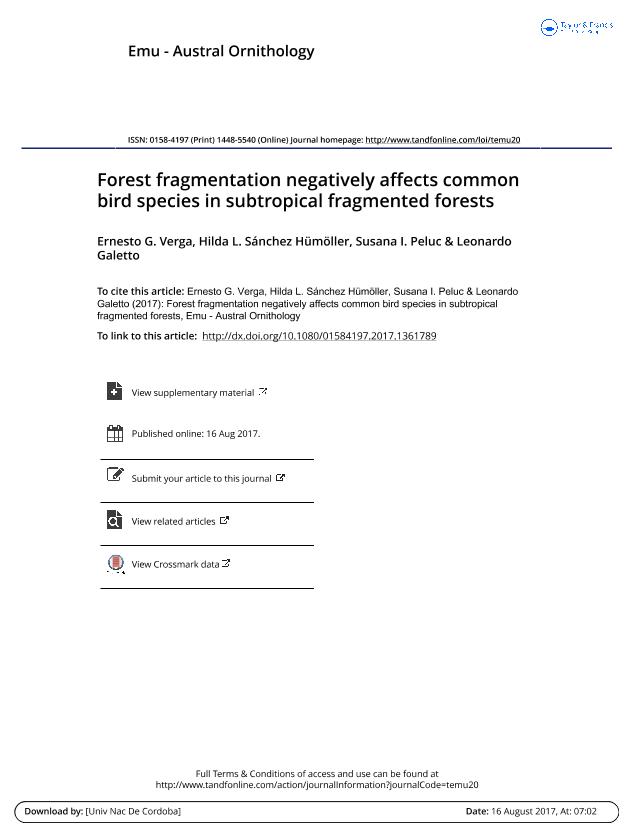Mostrar el registro sencillo del ítem
dc.contributor.author
Verga, Ernesto Gustavo

dc.contributor.author
Sanchez Humoller, Hilda Leticia

dc.contributor.author
Peluc, Susana Ines

dc.contributor.author
Galetto, Leonardo

dc.date.available
2017-11-01T15:40:11Z
dc.date.issued
2017-08
dc.identifier.citation
Verga, Ernesto Gustavo; Sanchez Humoller, Hilda Leticia; Peluc, Susana Ines; Galetto, Leonardo; Forest fragmentation negatively affects common bird species in subtropical fragmented forests; Csiro Publishing; Emu; 117; 4; 8-2017; 359-369
dc.identifier.issn
0158-4197
dc.identifier.uri
http://hdl.handle.net/11336/27314
dc.description.abstract
Forest fragmentation threatens bird species throughout the world. Previous studies suggest that the sensitivity of bird species to forest fragmentation is related to food abundance, and that this could be a key factor in understanding demographic changes. We assessed the relationship between forest fragment size, isolation and food abundance and the abundance of seven common species of birds in southern Chaco forests of Argentina, which use different food items, and are involved in different ecosystem processes. Relative abundance of Turdus amaurochalinus (Creamy-bellied Thrush) and Saltator aurantiirostris (Golden-billed Saltator) significantly decreased with patch size reduction, whereas relative abundance of Taraba major (Great Antshrike) decreased with patch isolation and increased with arthropod abundance. Chlorostilbon lucidus (Glittering-bellied Emerald), Elaenia parvirostris (Small-billed Elaenia), Polioptila dumicola (Masked Gnatcatcher) and Zonotrichia capensis (Rufous-collared Sparrow) appeared to be resilient to forest fragmentation. Body size was a good predictor of bird sensitivity, as only the largest species were negatively correlated with forest fragmentation. Previous work suggests that birds inhabiting Chaco forests may be resilient to forest fragmentation. This needs to be reconsidered in the light of our results since the abundance of three out of seven common bird species were negatively related to forest fragmentation.
dc.format
application/pdf
dc.language.iso
eng
dc.publisher
Csiro Publishing

dc.rights
info:eu-repo/semantics/openAccess
dc.rights.uri
https://creativecommons.org/licenses/by-nc-sa/2.5/ar/
dc.subject
Body Size
dc.subject
Food Abundance
dc.subject
Isolation
dc.subject
Patch Size
dc.subject
Species-Specific Response
dc.subject.classification
Bioquímica y Biología Molecular

dc.subject.classification
Ciencias Biológicas

dc.subject.classification
CIENCIAS NATURALES Y EXACTAS

dc.title
Forest fragmentation negatively affects common bird species in subtropical fragmented forests
dc.type
info:eu-repo/semantics/article
dc.type
info:ar-repo/semantics/artículo
dc.type
info:eu-repo/semantics/publishedVersion
dc.date.updated
2017-10-10T18:34:34Z
dc.identifier.eissn
1448-5540
dc.journal.volume
117
dc.journal.number
4
dc.journal.pagination
359-369
dc.journal.pais
Australia

dc.journal.ciudad
Collingwood
dc.description.fil
Fil: Verga, Ernesto Gustavo. Consejo Nacional de Investigaciones Científicas y Técnicas. Centro Científico Tecnológico Conicet - Córdoba. Instituto Multidisciplinario de Biología Vegetal. Universidad Nacional de Córdoba. Facultad de Ciencias Exactas Físicas y Naturales. Instituto Multidisciplinario de Biología Vegetal; Argentina
dc.description.fil
Fil: Sanchez Humoller, Hilda Leticia. Consejo Nacional de Investigaciones Científicas y Técnicas. Centro Científico Tecnológico Conicet - Córdoba. Instituto Multidisciplinario de Biología Vegetal. Universidad Nacional de Córdoba. Facultad de Ciencias Exactas Físicas y Naturales. Instituto Multidisciplinario de Biología Vegetal; Argentina
dc.description.fil
Fil: Peluc, Susana Ines. Consejo Nacional de Investigaciones Científicas y Técnicas. Centro Científico Tecnológico Conicet - Córdoba. Instituto de Diversidad y Ecología Animal. Universidad Nacional de Córdoba. Facultad de Ciencias Exactas Físicas y Naturales. Instituto de Diversidad y Ecología Animal; Argentina
dc.description.fil
Fil: Galetto, Leonardo. Consejo Nacional de Investigaciones Científicas y Técnicas. Centro Científico Tecnológico Conicet - Córdoba. Instituto Multidisciplinario de Biología Vegetal. Universidad Nacional de Córdoba. Facultad de Ciencias Exactas Físicas y Naturales. Instituto Multidisciplinario de Biología Vegetal; Argentina
dc.journal.title
Emu

dc.relation.alternativeid
info:eu-repo/semantics/altIdentifier/url/http://www.tandfonline.com/doi/full/10.1080/01584197.2017.1361789
Archivos asociados
